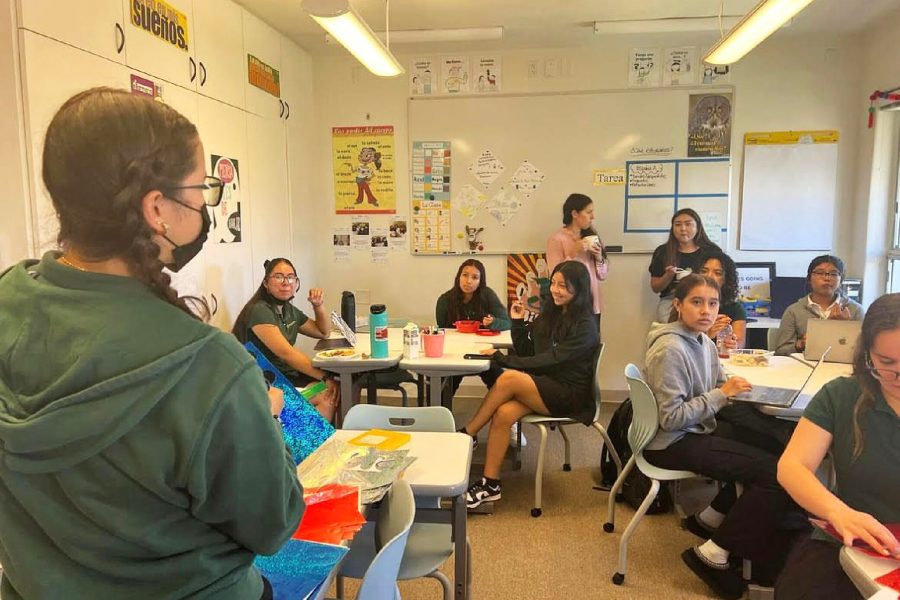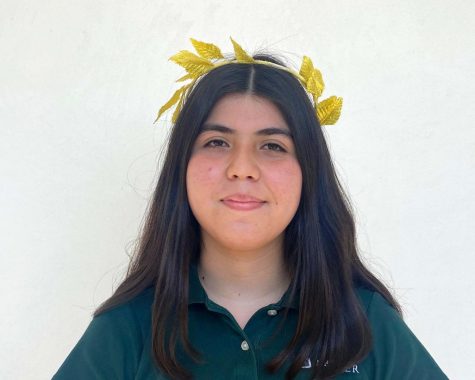Upper school students participate in first affinity space programming of school year
Photo credit: Martha Castro
Hermanas Unidas holds an affinity meeting for Archer students who identify as Latina or Hispanic. Archer offered six different affinity spaces Nov. 1 to upper school students.
November 3, 2022
Empathy is one of Archer’s three core values. Written in the honor code, the Archer community strives to “honor the individuality of those around us” with empathy. According to Dean of Student Life, Equity and Inclusion Samantha Hazell-O’Brien, Archer’s mission of implementing constant affinity spaces derives from this section in the honor code.
Upper school students had the opportunity to join the affinity spaces that they identified with Tuesday, Nov. 1. The spaces were Hermanas Unidas, Asian American and Pacific Islander Student Union, Black Student Union, Gender Sexuality Alliance, Jewish Student Union and Students Exploring Multi-Racial Identities. This day marked the first iteration of scheduled affinity spaces this year for students who identify with any of these groups.
“Last year, we had affinity spaces, but it was in reaction to events on campus. But, [the] best practice for affinity spaces is to have a space for community and fellowship unobstructed by other conflicts,” Hazell-O’Brien said. “We looked at strategic places where there are tensions or pinch-points. If, as a community, we say that we honor individualities, we have to have that in our school schedule.”
Junior Remi Cannon is co-president of the Gender Sexuality Alliance affinity club, and she said the preparation for this meeting was focused on finding joy and companionship within each other.
“We had a low turnout, but we were still very grateful to the people who did end up showing up. We kept it super light, [and] we based our entire meeting around guidelines, and then we played some games,” Cannon said. “We had a lot of fun debating hot topics in the queer community, and it was nice to come together.”
Hermanas Unidas executive board member Julissa Espinoza (’24) said affinity spaces provide a safe haven to share her experience as a Latina at Archer and learn about others within her community.
“It’s nice to come together with people similar to you and be in a room without judgement,” Espinoza said. “This week, we focused a lot on cultural traditions and our families, and we were able to share some that many of us related to — or even it’s beautiful when we don’t because then we learn from other people within our culture too.”
These affinity spaces were only open to upper schoolers, and Cannon said that was an aspect she appreciated. She also noted the importance of building in time for affinity into students’ schedules.
“Now that clubs are every other week, it’s really hard to try to find a time where we’re going to do strictly an affinity,” Cannon said. “We are an upper school and middle school club, and we always want to include them, but that also prevents us from having some darker conversations, so we were really happy that Archer provided this space for us.”
In the future, Espinoza said although it’s complicated to combine middle schoolers with upper schoolers due to certain meetings touching on heavier subjects, she sees the value of having a shared community.
“I feel mixed feelings. Some meetings are lighthearted, some are deeper,” Espinoza said. “But, if I were in middle school, I’d like the chance to be around Latina upper schoolers and hear their experiences about how their life is. I just remember looking up to them, so I want to be able to offer that to them right now too.”
Since the affinity programming Nov. 1 was the first execution of this new system, Hazell-O’Brien said she would be sending a survey to affinity leadership asking for feedback. Her goal is to find a common time to have a school-wide affinity offering. For now, middle school students will learn about what affinity spaces are and look like Dec. 12 before diving into a combined space with upper schoolers second semester.
“This feedback will help from middle school programming,” Hazell-O’Brien said. “We’ve already scheduled an assembly with them where we will be doing an affinity activity based on things like who has a sibling, who is the eldest child, who has pets — very low stakes ways to say ‘I have a shared interest and I’m going to discuss it.'”
Espinoza said a piece of feedback she has is in correlation to the lack of attendance, and she said she hopes more students participate in future affinity meetings.
“Some people thought it was optional and chose not to come, which I understand, but it would’ve been nice to have more turnout, and maybe making it mandatory might help that,” Espinoza said. “I really want people to understand how helpful these spaces are because, personally, I feel so liberated and connected with myself and others after each one.”









